
|
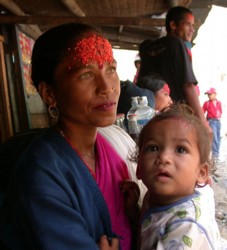
|
| Text and Context in Dialogue |

|

|
| Text and Context in Dialogue |
Cosmic relief and family grief: Conflicting views of Dasain,
by
"This feast is considered to be so obligatory that it has become a proverb that anybody who has not the means of celebrating it should sell one of his children to do so." So spoke the Abbé Dubois in 1906.[1] In any culture festivals are significant. Hindu festivals are a particularly difficult time for Nepali Christians from a Hindu background. The biggest of these festivals for many Nepalis is Dasain - typically the one annual occasion when families are reunited.
The church in Nepal has responded to Dasain by organising special programmes to provide an alternative for Christians from the "heavy pressure from the family to join in the celebrations, sacrifices and pujas".[2] Indeed the Nepal Christian Fellowship formed in 1959 met annually at Dasain.[3] Christians in the past have separated themselves from their Hindu families at festival times, so as not to 'compromise their faith'.
How do Hindus respond to this? Participation in Hindu religious activities is perhaps considered primarily a social activity, which does not necessarily imply belief in what you are doing, and so cannot contradict your own faith. Non-participation is therefore likely to be misunderstood or perceived negatively. Bharati argues that not participating in death ceremonies, which are a social event, 'does not communicate theological conviction but rather social belligerence'.[4] What messages do non-participating Nepali Christians give their Hindu neighbours at Dasain?
|
Hinduism's many festivals are a challenge for Nepali Christians. Hiebert comments that Christianity has often lacked appeal in Asia because "it appears joyless, colorless and drab" in comparison to the religions they already have.[5] With him, I would urge provision for Christian expression in music, art, literature, drama and festivals. Kehrberg's study of Nepali Christians revealed that, "100% stopped celebrating the national festivals of Dasain and Tihar," meaning that they "stopped being with their family at the festival times".[6] Nepali Christians do continue certain customs, such as removing their shoes, or living in joint families, but they have strongly rejected wearing the tika - the red dot on the forehead. |
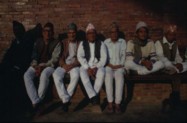
|
Psychologically such issues are significant. Rituals link participants with their social context and provide 'psychological and intellectual' as well as 'historical identity'.[7] Kehrberg asked Christians whether they had ever desired to return to their old religion. 11% of the study group affirmed they had had such a desire at some time. 'Situations that caused such thoughts included: during festival times; during times of persecution from family and villagers after becoming Christian; during times of loneliness particularly when they could not join friends for a religious function'.[8] Additionally participants reported increased feelings of stress, loneliness and separation specifically at Dasain.[9] A lack of cultural identity and community relationships creates psychological problems.[10]
Some Nepali Christians have challenged the current practice of the Nepali church at Dasain. K.B. Rokaya asks provocatively,
What if all Nepalis become Christians ...? What would be left of our culture, of our colourful traditions, of our ethical diversity? Non-Christian festivals and rituals are only talked about in terms of temptation. During Dasain, Tihar and national holidays churches organise events, in order to prevent people from going home and being tempted or forced to participate in the rituals. While Nepalis from all corners of the country and even from abroad travel home, Christians gather within the four safe walls of their churches. When people fail to abstain from rituals, for instance when they cut their hair or wear white clothes after a family member has died, they are not allowed to enter the church. [11]
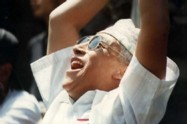
|
Dasain celebrates the victory of, 'Virtue over the forces of Evil'.[12] In one victory story Ram (incarnation of Lord Vishnu) prayed to Durga for victory against Ravana (King of the demons of Lanka) who had abducted his wife Sita.[13] Another myth tells of the goddess Durga's triumph over the king of the demons Mahishasura - the buffalo demon who 'threatened the balance of the world'.[14] "In her role as Mahishamardini (slayer of the buffalo demon), Durga is honoured every year during Durgapuja as the saviour of the world from evil."[15] |
In Nepal the goddess Durga is significant as Taleju, Ram's ancestral family deity, as the Malla kings adopted her as their clan goddess. "She is to this day the Divine Protectress of Nepal and her rulers, her temples standing adjacent to all the old royal palaces".[16] "The many feminine forms of the Divine are seen as embodiments of the Great Goddess (Mahadevi), who is manifest in all creation as shakti or divine energy."[17] Durga is one of the forms of the Goddess. She is depicted as a warrior. She has eight or ten arms, each holding a weapon donated by a male god; she rides a lion, symbol of authority.
The result of her victory is "cosmic relief".[18] "In the final hymn, the devas praise Devi as the mother of the universe, the cause of the final emancipation, the bestower of enjoyment and liberation, the one who removes all sufferings, who frees from fear and all evils."[19] "The Devimahatmya concludes with a promise given by the Goddess, to appear again and again, whenever the world is oppressed by demons too powerful to be handled by either Vishnu or Shiva."[20] Worship of Durga, long associated with military prowess, is popular among rulers seeking success in battle. Chaudari highlights the military aspect of the festival, and the accompanying animal sacrifices.[21] Dubois calls Dasain "the soldiers' feast".[22] Chaudari links the survival of Durga worship to areas where "Hindu rulers and the Hindu aristocracy have also survived, notably, in Rajputana, Nepal and Bengal".[23]
To get a better understanding of Dasain I interviewed a number of people in Tansen around the time of the festival in 2003.[24] All six of the Hindus I interviewed for this study said they were celebrating Dasain. The following were the elements that were most important to them: the family gathering, food, clothes, and the giving and receiving of tika and blessing from one's elders. Several mentioned that Dasain is a long-standing tradition handed down from their elders. One mentioned that it is a time of peace when the quarrels of the past year are forgotten.
When I asked whether the religious aspect of Dasain was important one respondent was dismissive, and did not expect to gain anything from the ritual worship. Another stated that he regarded the religious aspect as important. Others were obviously familiar with the rituals. One stated that one's conviction is not as important as what you do, so that the ritual aspects of Dasain are 'our culture' and are done whether one believes in them or not.
|
On a personal level, however, there was considerable diversity in how the festival was celebrated. One pious neighbour ate only one rice meal a day in the days leading up to the climax of the festival. She was happy to show me her worship room, and the jamara seeds she had planted. Another neighbour said she had no time to carry out the puja, and admitted she did not fast - such a thing was for older people to do. On the tenth day when senior family members give tika to their juniors, the majority of people were proudly parading their tika and new clothes as they walked from house to house to visit and receive blessings from others. Brown proposes that the momentum to continue traditional ceremonies, 'even among those for whom the religious meaning has never been known or has drained away, comes from family, and the wider social pressure of caste and kin. ... Rituals involving the whole family are the most resilient'.[25] I could see that it is hard to opt out. |
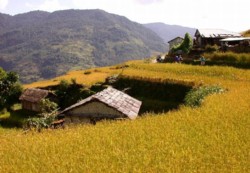
|
There were a few who did not wear a tika. Dasain, as with most festivals and life-cycle rituals, should not be celebrated by those who are ritually impure. This includes those who are mourning the death of a close patrilineal relative, by women who have just given birth, and by those who are menstruating. The shops of Muslims in the bazaar were conspicuous by being open, and their occupants were not wearing tika, but presumably not for reasons of ritual impurity.
Temple worship is not an important part of the Dasain celebration for most people I interviewed, though the Bhagawati temple in the centre of Tansen was thronging with people on the ninth morning, bringing plates of offerings to the goddess. On a public level, however, temple worship was clearly important. At the army barracks sacrifices were offered with military pomp, witnessed by civic officials, and attended by three priests.
Overall, throughout the general community there is a sense of good will at Dasain. Hospitality is warmly given and received. Friends and family came to visit. I saw poor men laden with gifts of festival food.
There is a striking contrast between the attitudes of Hindus to those of other faiths, and the attitudes of others to Hindus. One man wearing a tika said to me in a friendly manner that he also celebrates Christmas. He told me, "Though we worship in different ways we are worshipping the same god". Such an inclusive attitude has been noted by other observers:
... a Hindu may embrace a non-Hindu religion without ceasing to be a Hindu, and the Hindu is disposed to think synthetically and to regard other forms of worship ... as inadequate rather than objectionable ... few religious ideas are considered to be finally irreconcilable.[26]
The vast majority of Hindus I interviewed felt that Christians should join in the Dasain celebrations. Not all felt that the refusal to wear tika was equivalent to not participating in the festival. One Hindu stated openly that though Christians do not do puja or wear tika, they could still celebrate the festival together with their family and friends. "Christians should not be sad when everyone is happy," said another. One man felt that Christians could embrace Dasain as Christians praying to Jesus.
As for Christian feelings about Dasain, there is clearly a difference of intensity between those who had been Christians for some years and those who had not been Christians for long. All converts from Hinduism however, recalled the trouble they had once had at Dasain - 'it used to be hard'. Two women particularly expressed the marked contrast between their Christian faith and the idol worship around them. They voiced their sense of joy in the Lord at not having the pressure of having to do Hindu puja. 'We used to do sacrifices for forgiveness of sins, but we don't anymore because Jesus has been sacrificed once and for all'. One man was surprisingly candid as he reminisced about the sense of joyful anticipation he used to feel as Dasain approached.
It used to be nice, the rains are over, paths are cleared so the gods can come. Houses are cleaned, new clothes bought and tasty food prepared.
Another factor that makes a huge difference to the way Dasain is experienced by Christians is the existence of Christian relatives. One man, though he has been a Christian for nine years, still finds Dasain difficult because he is the only Christian in his family. Another man said,
I have to go home, though it's hard for me to face my parents. I hope it won't be so bad this year. The first year was difficult. I didn't have to wear tika last year, how will it be this year?
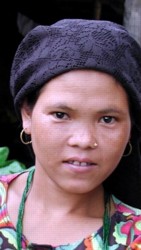
Photo by Morna Lincoln |
One woman, from a sympathetic but not Christian family, expressed a fear of persecution. For her there was clearly a Satanic element in the Hindu puja: 'I need to draw near to God and not do the things of Satan'. Another, an only child, with Hindu parents, said she felt frightened, but hoped that God would give her 'a way out of temptation'. She felt duty-bound to be at home with her Hindu mother helping prepare food for the many expected guests. She anticipated that it might be hard not to do the things she has always done. An older woman expressed her confusion, and her powerlessness in the face of taunts from her sons: What kind of religion is this? You can't celebrate Dasain, you can't wear tika, you can't eat meat,[27] what kind of religion is this you are following? On the other hand one woman whose father and older sister are also Christians does not find Dasain difficult. One's position in the family also has an influence on how one may choose to be involved or not. An older man, who had been a Christian for only one year, stated he would not be giving or receiving tika, or eating blood, or doing sacrifices. His position of authority in the family obviously gave him some immunity from family pressure. |
One Christian said she would not eat the food her neighbours had given her, as it was prasad - food offered to idols. Another had explained to his family that he also would not eat such food, and he was therefore given a separate portion. One Christian family who breed goats will not sell them at Dasain time for sacrifice. Another, out of respect for her parents however, was prepared to assist them by buying the necessary items, but would not participate in the ritual herself.
One new believer, who had received a tika from her mother against her will, was distraught:
The one who gives the tika can't eat until she has done so. It was hard for me to see my mother go hungry all day, so I received a tika, asking God for forgiveness. I did it deliberately, not in ignorance.
She said she had cried. She was disappointed that her prayers had not been answered: "God did not give me a way out of this temptation". She had felt alone, unsupported and out of reach of the church's help because of her particular family situation. "I am in a dilemma: should I go back to Hinduism or go on with Christianity?" She felt herself drawn back into Hinduism - "Satan tries to pull you back", yet she asked for prayer and wanted to be close to God. She felt that she had fallen back and needed the assurance of God's grace and forgiveness. Dasain highlighted for her the cost of commitment to Christ and the necessity of choosing between Hinduism and Christianity.
Another admitted feelings of nostalgia for the past - "I wore a tika up to the age of nineteen or twenty". This was mixed with sadness relating to his parents, because they are still Hindu, but a determination to focus on the Lord.
The Christians, therefore, were united in a strong revulsion to receiving tika and so adopted various strategies to avoid it. Several went to work or to the bazaar and so were not at home at the auspicious time. Others were present with their Hindu families when tika was given but did not receive it.
|
It was difficult to ascertain why wearing a tika is so reviled. One respondent said his conscience would not allow him to do so. Another said that the tika is given after worshipping idols, but 'we worship the one true God'. He explained that, though there is nothing inherently wrong with wearing red powder on one's forehead, a Christian should not do so, because it blurs the distinction between who is a Christian and who is a Hindu. He gave the same reason for why Christians should not eat food offered to idols. One man talked to his family in advance about his not wanting to wear tika or eat food sacrificed to idols, and they respected his wishes. Two men from the church went to one village home before Dasain to reason with a son of new believers concerning tika. This man later did not insist on receiving tika from his Christian parents. One believer thought that it would be hard for his Hindu father if he spent time with him at Dasain, so said he will take holiday later and go to visit him. This is a strategy adopted by other Christians too. One Christian admitted much pressure from his family to return home at Dasain. They say to him, "your brothers all come from abroad for Dasain, but you live near and don't come". This year he made an effort to be at home for tika time, and this was particularly welcomed, as one of his older brothers had not been able to return from India. |
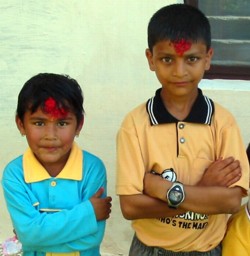
Photo by Rosalind Henwood |
Six of the more established believers spent Dasain with their Christian families, and expressed satisfaction at this: "We're not unhappy at Dasain, we're happy, we can give God glory and praise". They had not experienced particular problems. One said they had given particular thanks to God on that day because they were released from worshipping created things: "we are not ignorant, we can knowingly worship the living God in spirit and truth" (as opposed to the rituals going on around her). Three of them expressed concern about the difficulties of new believers, particularly as there was no church programme.
One young man felt Dasain was satisfactory for him this year - "maybe my parents were a bit sad, but it was not as bad as last year". He stated that Christians should be with their families at Dasain, that they should not give them pain. "We shouldn't hate the things they do, but we should explain clearly so they can understand". Another new Christian attested to God's help for her and her husband:
Even though we are poor speakers and illiterate, God protected us. He is with us.
She said that her sons had not protested when tika was neither given nor received. Moreover they had been satisfied with only two kilograms of meat, and so Dasain had not proven as expensive as it had been previously.
One young man was happy that this year his mother s understood his positionbetter. He overheard her on the telephone explaining to a questioning relative that she was happy that her son was following his own desire, and that she was no longer concerned about who would do the things required of a Hindu (particularly at her death).[28]
In spite of all the difficulties that were experienced by those I interviewed, I was impressed by some examples of relative harmony between Christian believers and their Hindu families. One believer found the tika-giving time easier for himself and his Hindu family by taking his family's photographs. One Hindu spoke positively about her Christian younger brother. He usually takes the initiative to invite her family at Dasain time, and they spend time together. "Some are Christians, some are Hindus but all are people," she said.
|
Up to now the Nepali church has assumed that Christians will not attend Dasain celebrations in their Hindu families, and that there will be an alternative church programme to attend. However, times are changing. Ostensibly because of the political situation, this year (for the first time) there was no organised programme in Hebron church, Tansen, on the tenth day of Dasain. This heightened the pressure on Christians to discover an appropriate way to spend the day, and this resulted in a degree of participation. All but one of the believers I interviewed, whether or not they originally intended to, spent Dasain with their families. If Christians in Nepal are to maintain good relations with their families the issues of prasad and tika need to be looked at again. There is clearly a very different attitude to such things on the part of Hindus and Christians. Could a fresh study of Scripture help to alleviate some of the strained relations that have been experienced throughout the history of the church? It is important for Nepali believers to go back to the Bible to get insight and not just accept the traditions that are passed on to them uncritically. Different generations within the church can support one another at Dasain. I hope that together they find a new way forward that will honour their families, whilst not compromising their commitment to Christ. |
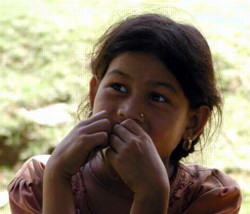
Photo by Morna Lincoln |
Notes
References
lived in Nepal from 1995-2004, first working under the United Mission to Nepal in a village of Gorkha district, and more recently with Medecins du Monde in Tansen.